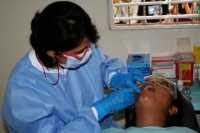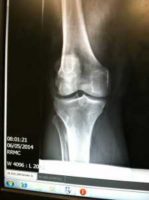Highest NSAID Usage Levels in Working Age Adults Linked to Greater Risk of Kidney Disease
Over the Counter Pain Meds May Worsen C. difficile Gut Infections
Ibuprofen Can Not Replace Antibiotics in Uncomplicated UTI
Are Opioids Effective for Dental Pain?
 Paul A. Moore, DMD, PhD, MPH
School of Dental Medicine
University of Pittsburgh
MedicalResearch.com: What is the background for this study? What are the main findings?
Response: Effective pain management is a priority in dental practice. Government and private agencies highlight the need to provide optimal pain relief, balancing potential benefits and harms of both opioid and nonopioid analgesic agents. The purpose of our study is to summarize the available evidence on the benefits and harms of analgesic agents, focusing on preexisting systematic reviews.
We found combinations of ibuprofen and acetaminophen as having the highest association with treatment benefit in adult patients and the highest proportion of adult patients who experienced maximum pain relief. Diflunisal, acetaminophen, and oxycodone were found to have the longest duration of action in adult patients. Medication and medication combinations that included opioids were among those associated most frequently with acute adverse events in both child and adult-aged patient populations.
(more…)
Paul A. Moore, DMD, PhD, MPH
School of Dental Medicine
University of Pittsburgh
MedicalResearch.com: What is the background for this study? What are the main findings?
Response: Effective pain management is a priority in dental practice. Government and private agencies highlight the need to provide optimal pain relief, balancing potential benefits and harms of both opioid and nonopioid analgesic agents. The purpose of our study is to summarize the available evidence on the benefits and harms of analgesic agents, focusing on preexisting systematic reviews.
We found combinations of ibuprofen and acetaminophen as having the highest association with treatment benefit in adult patients and the highest proportion of adult patients who experienced maximum pain relief. Diflunisal, acetaminophen, and oxycodone were found to have the longest duration of action in adult patients. Medication and medication combinations that included opioids were among those associated most frequently with acute adverse events in both child and adult-aged patient populations.
(more…)Which NSAID for Knee Pain Works Best?
 Deborah S. Cummins, PhD
Director, Research, Quality and Scientific Affairs
American Academy of Orthopaedic Surgeons
On behalf of the researchers:
David Jevsevar, MD, MBA; Gregory A. Brown, MD, PHD, and Deborah S. Cummins, PhD
MedicalResearch.com: What is the background for this study? What are the main findings?
Response: It is estimated that individuals have a 45% risk of developing knee osteoarthritis (OA) in their lifetime. As a result of the shifting demographics of the US, where an increasing percentage of the population is older than 65, the burden of knee OA will continue to increase. To help deal with this burden, effective nonsurgical treatments are needed to manage knee OA symptoms associated with pain and function before surgical intervention becomes necessary. To determine which non-surgical options are best, we performed a network meta-analysis exploring mixed treatment comparisons for nonsurgical treatment of knee osteoarthritis in order to effectively rank the various nonsurgical treatment options from best to worst.
Our network meta-analysis suggests that the single most effective nonsurgical treatment for improving knee function is function is naproxen, followed by diclofenac, celecoxib, and ibuprofen. When considering pain and function together, our data suggest that naproxen is the most effective treatment followed by IA corticosteroid injection.
The single most effective short-term (4-6 weeks) treatment for decreasing pain is intra-articular (IA) corticosteroid injection, followed by ibuprofen, IA platelet rich plasma, and naproxen. Additionally, intra-articular hyaluronic acid injections never achieved a rank in the top five treatments for pain, function, or combined pain and function. An analysis of 12 articles also found that HA is not significantly different than IA placebo in effect.
(more…)
Deborah S. Cummins, PhD
Director, Research, Quality and Scientific Affairs
American Academy of Orthopaedic Surgeons
On behalf of the researchers:
David Jevsevar, MD, MBA; Gregory A. Brown, MD, PHD, and Deborah S. Cummins, PhD
MedicalResearch.com: What is the background for this study? What are the main findings?
Response: It is estimated that individuals have a 45% risk of developing knee osteoarthritis (OA) in their lifetime. As a result of the shifting demographics of the US, where an increasing percentage of the population is older than 65, the burden of knee OA will continue to increase. To help deal with this burden, effective nonsurgical treatments are needed to manage knee OA symptoms associated with pain and function before surgical intervention becomes necessary. To determine which non-surgical options are best, we performed a network meta-analysis exploring mixed treatment comparisons for nonsurgical treatment of knee osteoarthritis in order to effectively rank the various nonsurgical treatment options from best to worst.
Our network meta-analysis suggests that the single most effective nonsurgical treatment for improving knee function is function is naproxen, followed by diclofenac, celecoxib, and ibuprofen. When considering pain and function together, our data suggest that naproxen is the most effective treatment followed by IA corticosteroid injection.
The single most effective short-term (4-6 weeks) treatment for decreasing pain is intra-articular (IA) corticosteroid injection, followed by ibuprofen, IA platelet rich plasma, and naproxen. Additionally, intra-articular hyaluronic acid injections never achieved a rank in the top five treatments for pain, function, or combined pain and function. An analysis of 12 articles also found that HA is not significantly different than IA placebo in effect.
(more…)15% of Ibuprofen Users May Take More Than Recommended Dose
 David Kaufman, ScD
Director, Slone Epidemiology Center, Boston Universit
Professor of Epidemiolog
Boston University School of Public Health
MedicalResearch.com: What is the background for this study?
Response: Ibuprofen and other nonsteroidal anti-inflammatory drugs (NSAIDs) are among the most-used medicines in the US, but, if too much is taken, can cause harm.
This was an internet-based diary study. 1326 individuals who reported taking an ibuprofen medication in the preceding month completed a daily diary of their NSAID use for one week. The daily dosage ingested was computed from the diary, which allowed us to determine whether a user exceed the recommended daily maximum dose.
(more…)
David Kaufman, ScD
Director, Slone Epidemiology Center, Boston Universit
Professor of Epidemiolog
Boston University School of Public Health
MedicalResearch.com: What is the background for this study?
Response: Ibuprofen and other nonsteroidal anti-inflammatory drugs (NSAIDs) are among the most-used medicines in the US, but, if too much is taken, can cause harm.
This was an internet-based diary study. 1326 individuals who reported taking an ibuprofen medication in the preceding month completed a daily diary of their NSAID use for one week. The daily dosage ingested was computed from the diary, which allowed us to determine whether a user exceed the recommended daily maximum dose.
(more…)NSAIDS Diclofenac and Ibuprofen Associated with Increased Risk of Cardiac Arrest
NSAIDS Have Minimal Effect On Back Pain and Risk GI Side Effects
Study Reevaluates NSAIDS For PDA in Premature Infants
NSAIDS May Increase Mortality From Endometrial Cancer
New Ibuprofen Formulation May Avoid Cardiac Side Effects
Can NSAIDs Prevent Some Basal Cell Skin Cancers?
 MedicalResearch.com Interview with:
Nirmala Pandeya, PhD
Post Doctoral Research Fellow
Faculty of Medicine and Biomedical Sciences, School of Public Health
Herston campus The University of Queensland
Medical Research: What is the background for this study?
Dr. Pandeya: Basal cell carcinoma (BCC) is the most common cancer. Although BCC is curable and has low mortality, its high occurrence in the population causes significant healthcare and financial burdens to the community. Hence exploring preventive strategies for this cancer is important in reducing the burden. To date few chemopreventives for BCC have been identified.
In many cancer cells, inflammatory biomarkers such as cyclooxygenase-2 (COX-2) and its product prostaglandin E2 are increased and basal cell carcinoma is no exception. Anti-inflammatory drugs, suppressing COX-2 activity, have been shown to reduce the risk of various cancers including squamous cell carcinoma of the skin, so they also have a potential to prevent BCC. But to date research evidence on the benefit of aspirin and other nonsteroidal anti-inflammatory drugs (NSAIDs) on basal cell carcinoma has been inconsistent. So we reviewed and synthesized all published epidemiological studies on NSAIDs and BCC to combine results and estimate the overall pooled effect.
Medical Research: What are the main findings?
Dr. Pandeya: After thorough evaluation, we identified eleven studies that were relevant and pooling showed a 10% reduction in risk of BCC among those using any kind of NSAIDs. Aspirin and non-aspirin NSAIDs analysed separately suggested a reduced risk of basal cell carcinoma, but were not statistically significant likely due to lack of power. Our research found strongest risk reduction of BCC by the use of NSAIDs among those with either a history of skin cancers or high prevalence of actinic keratosis.
(more…)
MedicalResearch.com Interview with:
Nirmala Pandeya, PhD
Post Doctoral Research Fellow
Faculty of Medicine and Biomedical Sciences, School of Public Health
Herston campus The University of Queensland
Medical Research: What is the background for this study?
Dr. Pandeya: Basal cell carcinoma (BCC) is the most common cancer. Although BCC is curable and has low mortality, its high occurrence in the population causes significant healthcare and financial burdens to the community. Hence exploring preventive strategies for this cancer is important in reducing the burden. To date few chemopreventives for BCC have been identified.
In many cancer cells, inflammatory biomarkers such as cyclooxygenase-2 (COX-2) and its product prostaglandin E2 are increased and basal cell carcinoma is no exception. Anti-inflammatory drugs, suppressing COX-2 activity, have been shown to reduce the risk of various cancers including squamous cell carcinoma of the skin, so they also have a potential to prevent BCC. But to date research evidence on the benefit of aspirin and other nonsteroidal anti-inflammatory drugs (NSAIDs) on basal cell carcinoma has been inconsistent. So we reviewed and synthesized all published epidemiological studies on NSAIDs and BCC to combine results and estimate the overall pooled effect.
Medical Research: What are the main findings?
Dr. Pandeya: After thorough evaluation, we identified eleven studies that were relevant and pooling showed a 10% reduction in risk of BCC among those using any kind of NSAIDs. Aspirin and non-aspirin NSAIDs analysed separately suggested a reduced risk of basal cell carcinoma, but were not statistically significant likely due to lack of power. Our research found strongest risk reduction of BCC by the use of NSAIDs among those with either a history of skin cancers or high prevalence of actinic keratosis.
(more…)NSAIDS Work For Menses Pain But Carry Risk of Side Effects
Antidepressants Plus NSAIDS May Increase Risk of Bleeding in Brain
NSAIDS May Be Helpful In Bladder Cancer Prevention
MedicalResearch.com Interview with: James Scheiman, M.D. Professor of Gastroenterology University of Michigan Medical School Medical Research: What is the background for this study? What...
NSAIDS After Heart Attack Increase Risk of Bleeding and Further Heart Attacks
MedicalResearch.com Interview with: Anne-Marie Schjerning Olsen, MD, PhD Department of Cardiology Gentofte Hospital, University of Copenhagen Denmark MedicalResearch.com: What is the background for this study? Dr....
NSAIDS May Prevent Some Squamous Cell Skin Cancers
 MedicalResearch.com Interview with:
Dr Catherine Olsen | Senior Research Officer
QIMR Berghofer Medical Research Institute
Royal Brisbane Hospital, QLD 4029
Medical Research: What is the background for this study? What are the main findings?
Response: Squamous cell carcinomas (SCCs)are the second most common skin cancer occurring in white skinned populations. They cause significant morbidity as they can invade local structures (often the nose or ears) and they also have the potential to metastasize although most are successfully treated before any spread occurs. They are also very expensive cancers to treat because they are so common, posing a significant burden on health care budgets. NSAIDS have been shown to be protective for other cancers (e.g. colorectal and oesophageal cancer). This prompted use to evaluate all of the available evidence on NSAIDs use and SCC by conducting a systematic review and meta-analysis of the association.
(more…)
MedicalResearch.com Interview with:
Dr Catherine Olsen | Senior Research Officer
QIMR Berghofer Medical Research Institute
Royal Brisbane Hospital, QLD 4029
Medical Research: What is the background for this study? What are the main findings?
Response: Squamous cell carcinomas (SCCs)are the second most common skin cancer occurring in white skinned populations. They cause significant morbidity as they can invade local structures (often the nose or ears) and they also have the potential to metastasize although most are successfully treated before any spread occurs. They are also very expensive cancers to treat because they are so common, posing a significant burden on health care budgets. NSAIDS have been shown to be protective for other cancers (e.g. colorectal and oesophageal cancer). This prompted use to evaluate all of the available evidence on NSAIDs use and SCC by conducting a systematic review and meta-analysis of the association.
(more…)Supplement May Reduce Cardiovascular Risks Linked to NSAIDS
 MedicalResearch.com Interview with:
Patompong Ungprasert, MD
Division of Rheumatology
Mayo Clinic, MN
Medical Research: What are the main findings of the study?
Dr. Ungprasert: We find a statistically significant association between NSAIDs (non-steroidal anti-inflammatory drugs) use and VTE (venous thromboembolism).
(more…)
MedicalResearch.com Interview with:
Patompong Ungprasert, MD
Division of Rheumatology
Mayo Clinic, MN
Medical Research: What are the main findings of the study?
Dr. Ungprasert: We find a statistically significant association between NSAIDs (non-steroidal anti-inflammatory drugs) use and VTE (venous thromboembolism).
(more…)Regular Use of Some NSAIDs May Increase Adverse Cardiovascular Events.
 MedicalResearch.com Interview with:
Anthony Bavry, MD MPH
Interventional Cardiology, North Florida/South Georgia Veterans Health System
Associate Professor of Medicine, University of Florida
Gainesville, FL 32610
Medical Research: What are the main findings of the study?
Dr. Bavry:
1) Among post-menopausal women, the regular use of NSAIDs was associated with an increased risk of cardiovascular death, myocardial infarction, or stroke.
2) Cardiovascular risk was observed among users of celecoxib, naproxen, but not ibuprofen.
(more…)
MedicalResearch.com Interview with:
Anthony Bavry, MD MPH
Interventional Cardiology, North Florida/South Georgia Veterans Health System
Associate Professor of Medicine, University of Florida
Gainesville, FL 32610
Medical Research: What are the main findings of the study?
Dr. Bavry:
1) Among post-menopausal women, the regular use of NSAIDs was associated with an increased risk of cardiovascular death, myocardial infarction, or stroke.
2) Cardiovascular risk was observed among users of celecoxib, naproxen, but not ibuprofen.
(more…)NSAIDS Associated with Atrial Fibrillation
MedicalResearch.com Interview with: Bruno Stricker, MB PhD Professor of Pharmaco-epidemiology Professor of Pharmacoepidemiology Erasmus MC MedicalResearch.com: What are the main findings of the study? Dr....
NSAIDS and Risk of Miscarriage
Report: NSAIDS reduce the severity of postpartum breast cancers in animal models
Published online on Aug. 7, 2011, the journal Nature Medicine reports that non-steroidal anti-inflammatory drugs including ibuprofen reduce the severity...



![MedicalResearch.com Interview with: David M. Aronoff, MD, FIDSA, FAAM Professor & Addison B. Scoville Jr. Chair in Medicine Director, Division of Infectious Diseases Department of Medicine Vanderbilt University Medical Center MedicalResearch.com: What is the background for this study? Response: Clostridium difficile infection (CDI) is a major cause of antibiotic-associated colitis and diarrhea and a leading cause of hospital-acquired infection. It is caused by the toxin-producing, anaerobic, spore-forming bacterium Clostridium difficile. Antibiotic use is a major risk factor for CDI but epidemiological studies suggest that other factors, some modifiable, some not, can also increase the risk for CDI. Older age is an example of a non-modifiable risk factor for CDI. Some epidemiological studies suggested that taking the prostaglandin synthesis inhibiting drugs called non-steroidal anti-inflammatory drugs (NSAIDs) might also increase the risk for CDI. NSAIDs include medications such as ibuprofen, naproxen, indomethacin, and others. Because NSAID use is so common, if it is a risk factor for the acquisition of, or severity of, CDI, that would be important because that would be a modifiable risk factor. We therefore sought to determine the impact of NSAID exposure on CDI severity in a mouse model of antibiotic-associated CDI. We also sought evidence for possible mechanisms whereby NSAIDs might increase the risk for CDI. MedicalResearch.com: What are the main findings? Response: Exposure of mice to indomethacin (an NSAID) for two days prior to infection with Clostridium difficile in antibiotic-exposed mice increased the severity of disease and this was associated with severe inflammation, changes to the bacterial populations in the colon and increased damage to the protective epithelial lining of the colon. MedicalResearch.com: What should readers take away from your report? Response: Our studies provide evidence in a mouse model of CDI that support human epidemiological studies linking NSAID use with CDI. MedicalResearch.com: What recommendations do you have for future research as a result of this work? Response: Studies in humans are needed to see if NSAID use is indeed a causal risk factor for CDI acquisition or severity. MedicalResearch.com: Is there anything else you would like to add? Response: This work was funded by the National Institutes of Health and the Crohn’s and Colitis Foundation of America. Dr. Aronoff has served as Consultant for Synthetic Biologics, Inc, Biocidium, NAEJA-RGM and BLC-USA on projects unrelated to this study. He also has research funding from Pfizer unrelated to this study. Citation: Damian Maseda, Joseph P. Zackular, Bruno Trindade, Leslie Kirk, Jennifer Lising Roxas, Lisa M. Rogers, Mary K. Washington, Liping Du, Tatsuki Koyama, V. K. Viswanathan, Gayatri Vedantam, Patrick D. Schloss, Leslie J. Crofford, Eric P. Skaar, David M. Aronoff. Nonsteroidal Anti-inflammatory Drugs Alter the Microbiota and Exacerbate Clostridium difficile Colitis while Dysregulating the Inflammatory Response. mBio, 2019; 10 (1) DOI: 10.1128/mBio.02282-18 [wysija_form id="3"] [last-modified] The information on MedicalResearch.com is provided for educational purposes only, and is in no way intended to diagnose, cure, or treat any medical or other condition. Always seek the advice of your physician or other qualified health and ask your doctor any questions you may have regarding a medical condition. In addition to all other limitations and disclaimers in this agreement, service provider and its third party providers disclaim any liability or loss in connection with the content provided on this website.](https://medicalresearch.com/wp-content/uploads/Dr-David-M.-Aronoff.jpg)